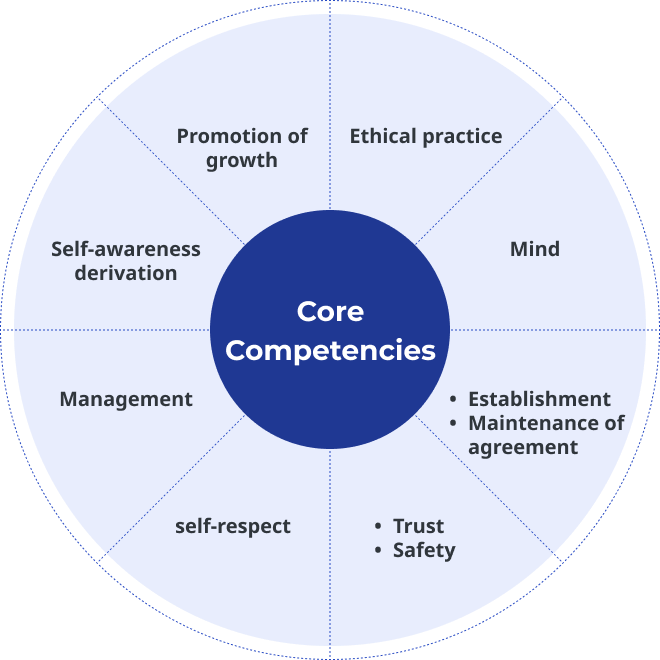메인 컨텐츠 영역
- 1. Work-Life Balance International
- 2. Coaching Basic
- 3. 5R Coaching Leadership
- 4. ICF Credential Courses
- 5. Work-Life Balance Life Coaching
- 6. Business Professional Coach Training
- 7. Emotional intelligence Coaching
ICF Credential Courses
Let's Develop the World's Best Coaching Skills to Get Started with Professional Coaching
ICF Coaching Core Competency Deepening Course is designed to help you develop and use the core skills of coaching in order to coach clients professionally. Based on 8 newly revised ICF Core Competencies, the course provides you an integrated approach to the skills and use of ICF's Coaching that has used by all the world's top coaches.
ICF 8 Core Competencies Model
ICF Core Competencies consists of the total of 8 competencies and each competency has an associated sub item, based on the purpose and meaning of each competency with process, question, feedback, active listening, encountering and reflection, to facilitate change and growth

“The Coaching Core Competencies Program is the best alternative to develop soft skills for individuals and leaders in the digital age.”
About Program
-
01
Advanced Coaching Skills
From the basics of coaching to the advanced skills. Integrated skills and competencies that a professional coach should have.
-
02
Professional Coaching Skills
Having abilities to handle skillfully different people, different subjects in different situations, as a professional coach.
-
03
Leadership Competency Development
Developing the leadership competencies including the insights, intuition and self management skills that are required to be leaders in these days.
-
04
Coaching Business
Beginning a career as a professional coach, having abilities and skills such as solution focused skills, future-oriented problem solving skills.
Module
-
1. Understanding of the Core Competencies of Coaching
-The expectation and effects of coaching
-Understanding the whole process
-Understanding the history and fields of coaching
-Understanding the definition and philosophy of coaching
-How to start coaching
-How to use the welcome package
-Familiarizing the process of each session in coaching -
2. ICF Coaching Core Competencies
-Ethics and norms of expertise
-Embodying a coaching mindset
-Co-creating the relationship
-Establishing and maintaining agreements
-Cultivating trust and safety
- Maintaining presence
-Group exercise and 1:1 partner practice -
3. Communicating Effectively
-Active listening
-Evoking awareness
-questions of 7 steps of Leadership growth
-Expanding awareness through metaphors, similes and case stories
-Observing visible feedback and implicit feedback
-practice and feedback on evoking awareness
Group practice and 1:1 partner practice -
4. Learning and Initiating Growth
-Promoting client's growth
-Execution coaching to drive change and performance
- Integration of 8 coaching skills
- Practice brief questioning skills of 8 coaching competencies
-Understanding and embodying skills through quizzes
-Comprehensive exercise of coaching skills and feedback
-Q & A and discussion -
5. Coaching Supervision and Deepening Competencies
-Understanding the criteria of ICF Core Competencies Evaluation
-Key points that make a difference in work and life
-3-in-1 small group coaching practice
-Supervision and group feedback
-Sharing stories of self-change and clients' success -
6. Practice and Certifications
After the completion of the course
After 100 practiced hours, ACC ICF credential.
After 200 practiced hours, KPC credential.
After 500 practiced hours, PCC ICF credential.
The Explanation of ICF Core Competencies
-
1. What is ICF Core Competencies?
ICF Core Competencies were developed to help organizational leaders, the general public who want to learn and communicate efficiently, and professionals who use ICF's definition of coaching as a profession and who understand the competencies of ICF as the criteria for the skills and practices in coaching. The definition and competencies of coaching of ICF has been the core knowledge for the ICF's CKA(the written test) in the certification process of ICF. ICF defines coaching as "partnering with Clients in a thought-provoking and creative process that inspires them to maximize their personal and professional potential."
-
2. The structure of ICF Core Competencies
The Core Competencies of Coaching are grouped into 4 large areas, categorized on the basis of general methods. The 8 sub-competencies under the 4 topics is not given any weight. The order of those items does not represent a hierarchy or dominance between the competencies. Every topic, sub-competencies and detailed items specifically designed to be implemented each important skill and competency by a coach to derive successful coaching performance.
-
3. Newly Revised ICF Core Competencies
ICF Core Competencies were newly revised for the first time in November 2019 after the first development in 1990. The updated core competencies have been incorporated into the ICF Certified Coach Training Programs in January 2021. The newly revised ICF 8 Core Competencies reflect the written and practical exams in early 2022. It is a skill that is relevant to the existing ICF Core Competency Model. The revised competencies have simpler and more solid structure integrated into a consistent and clear language than in the past.
ICF Core Competencies
-
1. Demonstrating Ethical Practice
Understands and consistently applies coaching ethics and standards of coaching.
-
2. Embodying a Coaching Mindset
Develops and maintains a mindset that is open, curious, flexible and client-centered.
-
3. Establishing and Maintaining Agreements
Partners with the client and relevant stakeholders to create clear agreements about the coaching relationship, process, plans and goals. Establishes agreements for the overall coaching engagement as well as those for each coaching session.
-
4. Creating Trust and Safety
Partners with the client to create a safe, supportive environment that allows the client to share freely. Maintains a relationship of mutual respect and trust..
-
5. Maintaining Presence
DEFINITION: Is fully conscious and present with the client, employing a style that is open, flexible, grounded and confident.
-
6. Listening Actively
Focuses on what the client is and is not saying to fully understand what is being communicated in the context of the client systems and to support client self-expression.
-
7. Evoking Awareness
Facilitates client insight and learning by using tools and techniques such as powerful questioning, silence, metaphor or analogy
-
8. Facilitating Client Growth
DEFINITION: Partners with the client to transform learning and insight into action. Promotes client autonomy in the coaching process
Both workshops and video conferencing classes Workshop: 9:30am-6:30pm. once a month, on a Saturday. Video conferencing class: between 8:00pm-10:30pm, once a week, total 40 hours.
